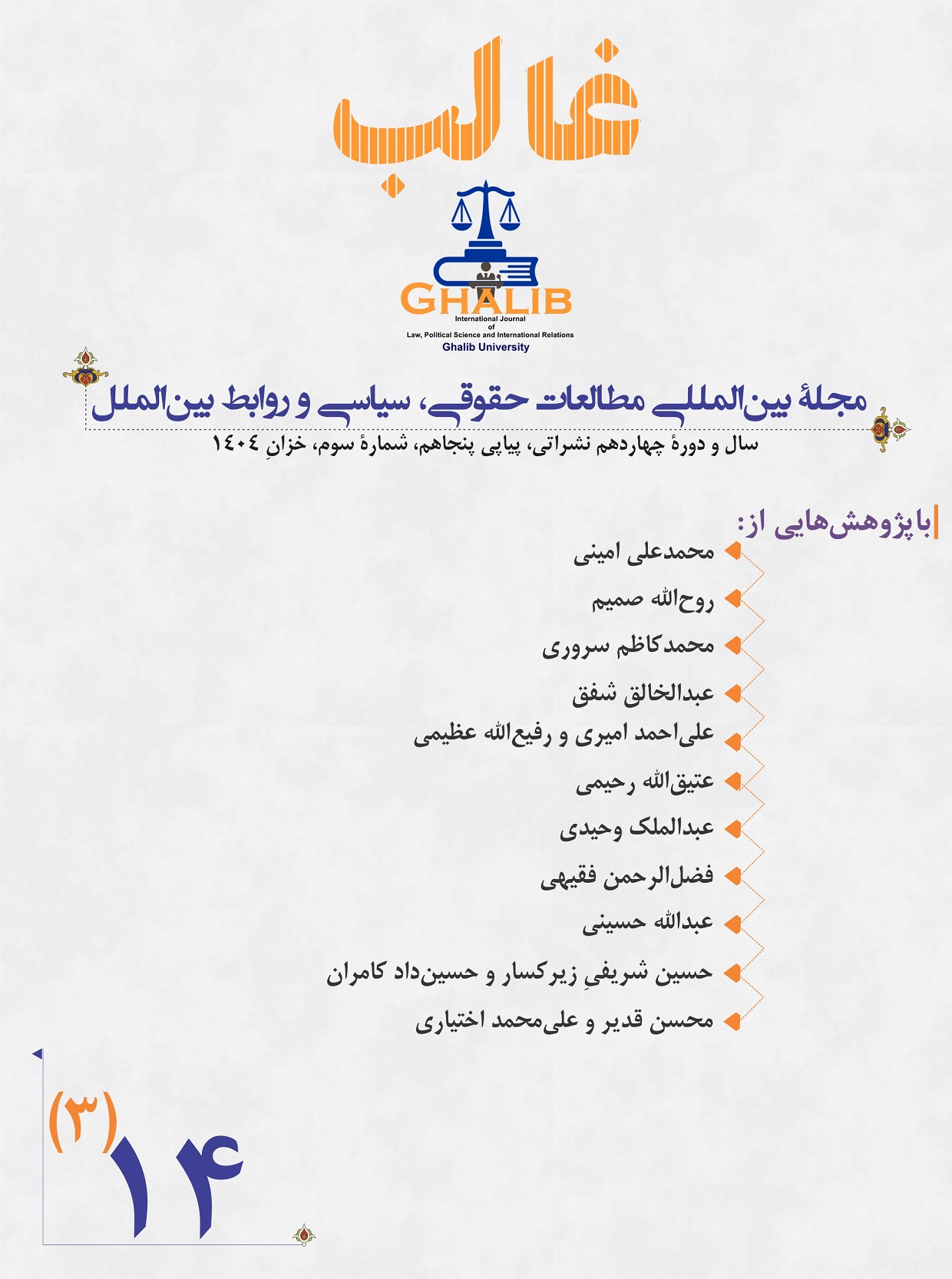Comparative Analysis of Civil Service Employees’ Rights and Duties in Afghanistan and Iran
DOI:
https://doi.org/10.58342/ghalibqj.V.14.I.3.9Keywords:
Afghanistan, administrative duties, civil service, comparative administrative law, employees’ rights, Iran, remuneration systemAbstract
The civil service system, as a fundamental component of public administration, plays a vital role in governmental efficiency, and the proper regulation and implementation of employees’ rights and obligations foster transparency, accountability, and administrative effectiveness. The significance of this study stems from the fact that, despite relatively clear legal frameworks in Afghanistan and Iran, structural and operational differences pose challenges to the full implementation of these laws, and understanding these differences can contribute to improving civil service performance. The primary aim of this research is to conduct a comparative analysis of the rights and obligations of civil service employees in the legal systems of Afghanistan and Iran and to provide recommendations for enhancing administrative structures, particularly in Afghanistan. The main research questions are: what are the similarities and differences in the rights and obligations of civil service employees in Afghanistan and Iran, and what reforms can enhance the efficiency of these systems? This study employs a qualitative methodology with a comparative approach, utilizing books, legal documents, regulations, decrees, and scholarly studies as data sources, with the scope limited to the civil service legal systems of the two countries. The findings indicate that employment principles, financial rights, and ethical obligations are largely similar in both countries; however, differences exist in payment systems, retirement, oversight, and enforcement mechanisms. Challenges such as centralization, administrative corruption, and legal complexity affect the efficiency of the civil service, and addressing these issues can significantly improve administrative effectiveness.
References
Esmaeili, Mohammad, Najabatkhah, Morteza, & Gorji Azandriyani, Ali Akbar. (2025). Pathology of the salary and benefits system from the perspective of employment justice. Scientific-Research Journal of New Studies in Administrative Law, 7(22), 225–252. https://www.malr.ir/article_714261.html [In Persian]
Danish, Sarwar. (2015). Administrative law of Afghanistan. Kabul: Ibn Sina University Publications. [In Persian]
Rahimi, Salar. (2016). Public administration of Afghanistan. Herat: Quds. [In Persian]
Zwaytgard, Konrad, & Kutz, Heine. (2014). Introduction to comparative law (Elias Noei Mohammad Noei, Trans.). Tehran: Majd. [In Persian]
Tabatabaei Motameni, Manouchehr. (2011). Administrative law. Tehran: Printing and Publishing Organization, Ministry of Culture and Islamic Guidance. [In Persian]
Labor Law of Civil Service of Afghanistan. (2017). Afghanistan: Approved by the National Assembly of Afghanistan. [In Persian]
Civil Service Management Law. (2007). Iran: Approved by the Islamic Consultative Assembly. [In Persian]
Karimi, Mahmoud, Vaezi, Seyed Mojtaba, & Faqih Habibi, Ali. (2021). Capacities and implementable patterns in Iran’s administrative system for applying the new public management model. Administrative Law, 9(29), 195–218. https://qjal.smtc.ac.ir/article-1-939-fa.html [In Persian]
Mohammadi Tamaki, Abdul Ali. (2011). Administrative law of Afghanistan. Tehran: Erfan. [In Persian]
Regulation on the Conduct of Civil Service Officers. (2006). Iran: Approved by the Council of Ministers. [In Persian]
Hedavand, Mehdi. (2017). Comparative administrative law. Tehran: SAMT. [In Persian]
Hemmati, Mojtaba. (2022). Scope and exceptions of the Civil Service Management Law and Labor Law: Challenges and solutions. Scientific-Research Journal of New Studies in Administrative Law, 4(11), 243–274. https://doi.org/10.22034/mral.2022.539410.1193 [In Persian]
Council of Ministers. (2023). Regulation on promoting professional ethics in the administrative system (Approval No. 236541/T61065, dated March 11, 2023). Iran: Administrative and Recruitment Organization. https://shenasname.ir/salamat/60800-آیین-نامه-ارتقای-اخلاق-حرفهای [In Persian]
United Nations Development Programme Afghanistan. (2022). Capacity building in the civil service sector. United Nations Development Programme. https://www.undp.org/afghanistan
International Labour Organization. (2022). Employment in Afghanistan in 2022: Labour market changes post-August 2021. Geneva: International Labour Organization. [PDF file]
Independent Administrative Reform and Civil Service Commission, Islamic Republic of Afghanistan. (2023). Annual report: Achievements and challenges. Kabul: Independent Administrative Reform and Civil Service Commission. https://www.developmentaid.org/donors/view/147711/independent-admintrative-reform-and-civil-service-comission-afghanistan
Ministry of Labour and Social Affairs, Islamic Republic of Afghanistan. (2023). Strategic plan for social protection and workforce development. Kabul: Ministry of Labour and Social Affairs. https://aop.gov.af/en
Zubair Rased. (2023, January 5). Civil service reforms in Afghanistan: A study of Independent Administrative Reform and Civil Service Commission (IARCSC) since 2017 [Working paper]. SSRN. https://papers.ssrn.com/sol3/papers.cfm?abstract_id=4316057
Administrative Office of the President, Islamic Emirate of Afghanistan. (n.d.). Official website. Retrieved September 12, 2025, from https://aop.gov.af/en
Supreme Audit Office of Afghanistan. (n.d.). Organization profile. Retrieved September 12, 2025, from https://www.devex.com/organizations/supreme-audit-office-of-afghanistan-133047
Seyed Siami Namini. (2020). The new public management: Administrative reform in Iran. SSRN Electronic Journal. https://doi.org/10.2139/ssrn.3534437
Ahmad Razini, Mohammad Dehghani, & Neda Vahidi. (2024). Structural resistance to administrative reform in Iran. Journal of Iranian Public Policy, 12(1), 35–52. https://jmr.usb.ac.ir/article_3507.html
United Nations Development Programme. (2022). Civil service salary structure in fragile states: The case of Afghanistan. United Nations Development Programme. https://www.undp.org/afghanistan
International Labour Organization. (2022, January). Employment prospects in Afghanistan: A rapid impact assessment (ILO Brief). Geneva: International Labour Organization. https://www.ilo.org/media/7886/download
Independent Administrative Reform and Civil Service Commission, Islamic Republic of Afghanistan. (2023). Monitoring report on civil service reforms. Kabul: Independent Administrative Reform and Civil Service Commission. https://www.developmentaid.org/donors/view/147711/independent-admintrative-reform-and-civil-service-comission-afghanistan
Administrative Office of the President, Islamic Emirate of Afghanistan. (2024). The challenges of decentralization in Afghanistan. https://www.aopnews.com/taliban/the-challenges-of-decentralization-in-afghanistan/
The World Bank. (2024). Singapore’s civil service: A model for efficiency and integrity. https://www.worldbank.org/en/country/singapore/overview
Organisation for Economic Co-operation and Development (OECD). (2021). Public employment and management in South Korea: Reform strategies. Paris: OECD Publishing. https://www.oecd.org/content/dam/oecd/en/publications/reports/2020/08/the-2018-2021-working-time-reform-in-korea-a-preliminary-assessment_6d52ea72/0e828066-en.pdf
Min Thant Han. (2019, August). Analysing the effectiveness of civil service training course: A case study on Central Institute of Civil Service of Myanmar Union Civil Service Board [PDF]. [Local file]
Downloads
Published
How to Cite
Issue
Section
License
Copyright (c) 2025 عبدالله حسینی

This work is licensed under a Creative Commons Attribution 4.0 International License.













